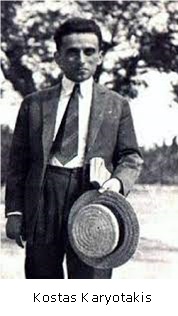Kostas Karyotakis, in Greek: Κώστας Καρυωτάκης, (30 October 1896-20 July 1928) is considered one of the most representative Greek poets of the 1920s and one of the first poets to use iconoclastic themes in Greece.
His poetry conveys a great deal of nature, imagery and traces of expressionism and surrealism. He also belongs to the Greek Lost Generation movement.
The majority of Karyotakis' contemporaries viewed him in a dim light throughout his lifetime without a pragmatic accountability for their contemptuous views; for after his suicide, the majority began to revert to the view that he was indeed a great poet. He had a significant, almost disproportionately, progressive influence on later Greek poets.
Karyotakis gave existential depth as well as a tragic dimension to the emotional nuances and melancholic tones of the neo-Symbolist and new-Romantic poetry of the time.
With a rare clarity of spirit and penetrating vision, he captures and conveys with poetic daring the climate of dissolution and the impasses of his generation, as well as the traumas of his own inner spiritual world.
Karyotakis was born in Tripoli, Greece, his father's occupation as a county engineer resulted in his early childhood and teenage years being spent in various places, following his family's successive moves around the Greek cities, including Argostoli, Lefkada, Larisa, Kalamata, Athens and Chania. He started publishing poetry in various magazines for children in 1912. It is solely rife speculation that he had felt deeply betrayed that a girl he had cared for in Hania in 1913 had married and sent him into melancholy.
After receiving his degree from the Athens School of Law and Political Sciences, in 1917, he did not pursue a career as a lawyer. Karyotakis became a clerk in the Prefecture of Thessaloniki. However, he greatly disliked his work and could not tolerate the bureaucracy of the state, which he wrote about often in his poems. His prose piece Catharsis is characteristic of this. For this reason he would often be removed from his posts and transferred to other locations in Greece. During these removals he became familiar with the boredom and misery of the country during World War I.
In February 1919, he published his first collection of poetry: The Pain of People and of Things, in Greek Ὁ πόνος τοῦ ἀνθρώπου καὶ τῶν πραμάτων, which was largely ignored or badly reviewed by the critics. In the same year he published, with his friend Agis Levendis, a satirical review, called The Leg, which, despite its success, was banned by the police after the sixth issue.
More information: All Poetry
In 1921, he published his second collection called Nepenthe, in Greek Νηπενθῆ, and also wrote a musical revue, Pell-Mell, in Greek Πελ-Μελ.
In 1922, he began having an affair with the poet Maria Polydouri who was a colleague of his at the Prefecture of Attica.
In 1923, he wrote a poem called Treponema pallidum, in Greek Ὠχρὰ Σπειροχαίτη, which was published under the title Song of Madness and gave rise to speculation that he may have been suffering from syphilis, which before 1945 was considered a chronic illness with no proven cure for it.
George Skouras, a physician of the poet, wrote: He was sick, he was syphilitic and George Savidis (1929–1999), professor of the Aristotle University of Thessaloniki, who possessed the largest archive about Greek poets, revealed that Karyotakis was syphilitic, and that his brother, Thanasis Karyotakis, thought the disease to be a disgrace to the family.
In 1924, he travelled abroad, visiting Italy and Germany.
In December 1927 he published his last collection of poetry: Elegy and Satires, in Greek Ἐλεγεῖα καὶ Σάτιρες.
In February 1928, Karyotakis was transferred to Patras although soon afterwards he spent a month on leave in Paris and in June 1928 he was sent yet again to Preveza by ship.
Karyotakis lived in Preveza only for 33 days, until his suicide on 21 July 1928 at age 31. His work was in the Prefecture of Preveza, in the Palios mansion, 10 Speliadou street, as a lawyer for control of land donations from the State to refugees from Asia Minor War of 1922.
From Preveza he sent desperate letters to friends and relatives describing the misery he felt in the town. His family offered to support him for an indefinite stay in Paris, but he refused, knowing what a monetary sacrifice like this would entail for them. His angst is felt in the poem Preveza, in Greek Πρέβεζα, which he wrote shortly before his suicide. The poem displays an insistent, lilting anaphora on the word Death, which stands at the beginning of several lines and sentences.
On 19 July 1928, Karyotakis went to Monolithi beach and kept trying to drown in the sea for ten hours, but failed in his attempt, because he was an avid swimmer as he himself wrote in his suicide note. In the subsequent morning he returned home and left again to purchase a revolver and went to a little café in the place Vryssoula, near today Hotel Zikas. After smoking for a few hours, and drink cherry juice, he left 75 drachmas as a gratuity, while the cost of the drink was 5 drachmas, he went to Agios Spyridon, where, under a eucalyptus tree, he shot himself through the heart.
More information: Poem Hunter
"do I exist?" you say, and then: "you do not!"
Kostas Karyotakis

No comments:
Post a Comment